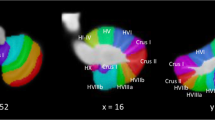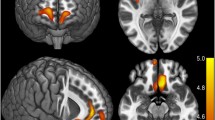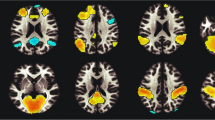Abstract
Structural cerebral deficiencies in smokers have been well characterized by morphometric investigations focussing on cortical and subcortical structures. Although the role of the cerebellum is increasingly noted in mental and addiction disorders, no reports exist regarding cerebellar alterations in smokers employing a methodology specifically designed to assess the cerebellar morphology. We acquired high-resolution MRI scans from 33 heavy smokers and 22 never-smokers and used a voxel-based morphometry (VBM) approach utilizing the Spatially Unbiased Infratentorial (SUIT) toolbox (Diedrichsen 2006) to provide an optimized and fine-grained exploration of cerebellar structural alterations associated with smoking. Relative to never-smokers, smokers showed significant reductions of grey matter volume in the right cerebellum Crus I. The grey matter volume in Crus I correlated negatively with the amount of nicotine dependence as assessed by means of the Fagerström scale. Since Crus I has been identified as the cognitive division of the cerebellum, the structural deficit may in part mediate cognitive deficits previously reported in smokers. Of note, the dependence-related magnitude of the volume deficit may support the notion that the cerebellum is substantially involved in core mechanisms of drug dependence.


Similar content being viewed by others
References
Babor TF, Higgins-Biddle JC, Saunders JB, Monteiro MG (2001) The Alcohol Use Disorders Identification Test. Guidelines for Use in Primary Care. WHO
Benowitz NL (2008) Clinical pharmacology of nicotine: Implications for understanding, preventing, and treating tobacco addiction. Clin Pharmacol Ther 83(4):531–541
Brody AL, Mandelkern MA, Jarvik ME, Lee GS, Smith EC, Huang JC et al (2004) Differences between smokers and nonsmokers in regional grey matter volumes and densities. Biol Psychiatry 55:77–84
Chen WJ, Edwards RB, Romero RD, Parnell SE, Monk RJ (2003) Long-term nicotine exposure reduces Purkinje cell number in the adult rat cerebellar vermis. Neurotoxicol Teratol 25:329–334
Diedrichsen J (2006) A spatially unbiased atlas template of the human cerebellum. NeuroImage 33:127–138
Diedrichsen J, Balsters JH, Flavell J, Cussans E, Ramnani N (2009) A probabilistic MR atlas of the human cerebellum. NeuroImage 46:39–46
Diedrichsen J, Verstynen T, Schlerf J, Wiestler T (2010) Advances in functional imaging of the human cerebellum. Curr Opin Neurol 23(4):382–387
Domino EF, Minoshima S, Guthrie S, Ohl L, Ni L, Koeppe RA, Zubieta JK (2000) Nicotine effects on regional cerebral blood flow in awake, resting tobacco smokers. Synapse 38:313–321
Durazzo TC, Gazdzinski S, Banys P et al (2004) Cigarette smoking exacerbates chronic alcohol-induced brain damage: a preliminary metabolite imaging study. Alcohol Clin Exp Res 28:1849–1860
Durazzo TC, Cardenas VA, Studholme C, Weiner MW, Meyerhoff DJ (2007) Non-treatment-seeking heavy drinkers: effects of chronic cigarette smoking on brain structure. Drug Alcohol Depend 87(1):76–82
Ernst M, Heishman SJ, Spurgeon L, London ED (2001) Smoking history and nicotine effects on cognitive performance. Neuropsychopharmacology 25:313–319
First MB, Spitzer RL, Gibbon M, and Williams, Janet BW (2002) Structured clinical interview for DSM-IV-TR axis I disorders, research version, patient edition. (SCID-I/P) New York: Biometrics Research, New York State Psychiatric Institute, November
Foulds J, Stapleton J, Swettenham J, Bell N, McSorley K, Russell MA (1996) Cognitive performance effects of subcutaneous nicotine in smokers and never-smokers. Psychopharmacology 127:31–38
Fukuda H, Kitani M (1996) Cigarette smoking is correlated with the periventricular hyperintensity grade on brain magnetic resonance imaging. Stroke 27:645–649
Galanis DJ, Petrovich H, Launer L, Harris TB, Foley DJ, White LR (1997) Smoking history in middle-aged and subsequent cognitive performance in elderly Japanese–American men. The Honolulu–Asia Aging Study. Am J Epidemiol 145:507–515
Gallinat J, Meisenzahl E, Jacobsen LK, Kalus P, Bierbrauer J, Kienast T et al (2006) Smoking and structural brain deficits: a volumetric MR investigation. Eur J Neurosci 24:1174–1750
Gazdzinski S, Durazzo TC, Studholme C, Song E, Banys P, Meyerhoff DJ (2005) Quantitative brain MRI in alcohol dependence: preliminary evidence for effects of concurrent chronic cigarette smoking on regional brain volumes. Alcohol Clin Exp Res 29:1484–1495
Ghatan PH, Ingvar M, Eriksson L, Stone-Elander S, Serrander M, Ekberg K, Wahren J (1998) Cerebral effects of nicotine during cognition in smokers and never-smokers. Psychopharmacology 136:179–189
Hayasaka S, Nichols TE (2004) Combining voxel intensity and cluster extent with permutation test framework. NeuroImage 23:54–63
Heatherton TF et al (1991) The Fagerström Test for Nicotine Dependence: a revision of the Fagerström Tolerance Questionnaire. Br J Addict 86:1119–1127
Heishman SJ, Snyder FR, Henningfield JE (1993) Performance, subject, and physiological effects of nicotine in nonsmokers. Drug Alcohol Depend 34:11–18
Kühn S, Schubert F, Gallinat J (2010) Reduced thickness in medial orbitofrontal cortex in smokers. Biol Psychiatry 68:1061–1065
Kumari V, Grey JA, Ffytche DH, Mitterschiffthaler MT, Das M, Zacariah E et al (2003) Cognitive effects of nicotine in humans: an fMRI study. NeuroImage 19:1002–1013
Landers DM, Crews DJ, Boutcher SH, Skinner JS, Gustafsen S (1992) The effects of smokeless tobacco on performance and psychophysiological response. Med Sci Sports Exerc 24:895–903
Leiner H, Leiner A, Dow R (1986) Does the cerebellum contribute to mental skills? Behav Neurosci 100:443–454
Lindenberg A, Brinkmeyer J, Dahmen N, Gallinat J, de Millas W, Mobascher A, Wagner M, Schulze-Rauschenbach S, Gründer G, Spreckelmeyer KN, Clepce M, Thürauf N, von der Goltz C, Kiefer F, Steffens M, Holler D, Díaz-Lacava A, Wienker T, Winterer G (2011) The German multi-centre study on smoking-related behavior-description of a population-based case-control study. Addict Biol
Longstreth WT, Arnold AM, Manolio TA, Burke GL, Bryan N, Jungreis CA et al (2000) Clinical correlates of ventricular and sulcal size on cranial magnetic resonance imaging of 3, 301 elderly people: the cardiovascular health study. Neuroepidemiology 19:30–42
Longstreth WT, Diehr P, Manolio TA, Beauchamp NJ, Jungreis CA, Lefkowitz D (2001) Cluster analysis and patterns of findings on cranial magnetic resonance imaging of the elderly: the cardiovascular health study. Arch Neurol 58:635–640
Olbrich HM, Valerius G, Pais C, Hagenbuch F, Ebert D, Juengling FD (2006) Brain activation during craving for alcohol measured by positron emission tomography. Aust NZ J Psychiatry 40:171–178
Oldfield RC (1971) The assessment and analysis of handedness: the Edinburgh inventory. Neuropsychologia 9:97–113
Ott A, Andersen K, Dewey ME, Letenneur L, Brayne C, Copeland JRM et al (2004) Effect of smoking on global cognitive function in non-demented elderly. Neurology 62:920–924
Richards M, Jarvis MJ, Thompson N, Wadsworth MEJ (2003) Cigarette smoking and cognitive decline in midlife: evidence from a prospective birth cohort study. Am J Public Health 93:994–998
Sakuri Y, Kanazawa I (2002) Acute effects of cigarettes in nondeprived smokers on memory, calculation and executive functions. Hum Psychopharmacol Clin Exp 17:369–373
Schmahmann JD (1991) An emerging concept: the cerebellar contribution to higher function. Arch Neurol 48:1178–1187
Schmahmann JD (1996) From movement to thought: anatomic substrates of the cerebellar contribution to cognitive processing. Hum Brain Mapp 4:174–198
Sheehan DV, Lecurbier Y, Sheehan KH, Amorim P, Janavs J, Weiller E, Hergueta T, Barker R, Dunbar GC (1998) The Mini-international Neuropsychiatric Interview (M.I.N.I.): the development and validation of a structured diagnostic psychiatric interview for DSM-IV and ICD-10. J Clin Psychiatry 59(Suppl 20):22–33
Smolka MN, Buhler M, Klein S, Zimmermann U, Mann K et al (2006) Severity of nicotine dependence modulates cue-induced brain activity in regions involved in motor preparation and imagery. Psychopharmacology 184:577–588
Starr JM, Deary IJ, Fox HC, Whalley LJ (2007) Smoking in cognitive change from age 11 to 66 years: a confirmatory investigation. Addict Behav 32:63–68
Stoodley CJ, Schmahmann JD (2009) Evidence for topographic organization in the cerebellum of motor control versus cognitive and affective processing. Cortex 46:831–844
Strick PL, Dum RP, Fiez JA (2009) Cerebellum and nonmotor function. Annu Rev Neurosci 32:413–434
Warbrick T, Mobascher A, Brinkmeyer J, Musso F, Stoecker T, Shah NJ, Vossel S, Winterer G (2011) Direction and magnitude of nicotine effects on the fMRI BOLD response are related to nicotine effects on behavioral performance. Psychopharmacology (Berl) 215(2):333–344
Ward MF, Wender PH, Reimherr FW (1993) The Wender Utah Rating Scale: an aid in the retrospective diagnosis of childhood Attention Deficit Hyperactivity Disorder. Am J Psychiatry 150:885–890
Xiao Z, Lee T, Ahang JX, Wu Q, Wu R et al (2006) Thirsty heroin addicts show different fMRI activations when exposed to water-related and drug-related cues. Drug Alcohol Depend 83:157–162
Yalachkov Y, Kaiser J, Naumer MJ (2009) Brain regions related to tool use and action knowledge reflect nicotine dependence. J Neurosci 29:4922–4929
Zubieta JK, Heitzeg MM, Xu Y, Koeppe RA, Ni L, Guthrie S, Domino EF (2005) Regional cerebral blood flow responses to smoking in tobacco smokers after overnight abstinence. Am J Psychiatry 162:567–577
Acknowledgments
This study was conducted within the framework of the German Priority Program (SPP1226) http://www.nicotine-research.com: Nicotine: Molecular and Physiological Effects in CNS on Nicotine Dependence funded by the German Research Foundation (Deutsche Forschungsgemeinschaft, DFG). Project: Wi1316/7-1. SK is a Postdoctoral Fellow of the Research Foundation Flanders (FWO).
Author information
Authors and Affiliations
Corresponding author
Rights and permissions
About this article
Cite this article
Kühn, S., Romanowski, A., Schilling, C. et al. Brain grey matter deficits in smokers: focus on the cerebellum. Brain Struct Funct 217, 517–522 (2012). https://doi.org/10.1007/s00429-011-0346-5
Received:
Accepted:
Published:
Issue Date:
DOI: https://doi.org/10.1007/s00429-011-0346-5




